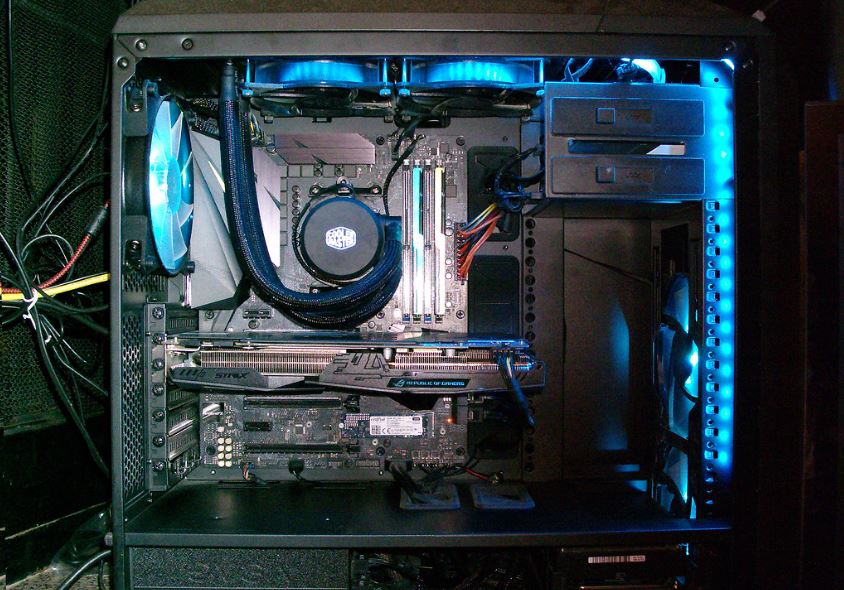Table of Contents
In recent years, RGB (Red-Green-Blue) lighting has become a popular trend in the world of computer hardware, transforming PCs into vibrant displays of customizable colors. However, a debate persists regarding the potential impact of RGB lighting on CPU performance.
In this article, we delve into the subject and explore whether RGB lighting truly affects the performance of your CPU or if it is merely an aesthetic choice.
Understanding RGB Lighting:
To set the stage, we provide a brief overview of RGB lighting and its prevalence in modern computer systems. We explain how RGB lighting works, the different types of RGB implementations, and the various components that can be illuminated, such as fans, keyboards, and cases.
CPU Performance Factors:
Next, we dive into the critical factors that influence CPU performance. We explore concepts such as clock speed, core count, cache size, and architectural advancements, which are typically the primary determinants of a CPU’s overall performance.
By establishing these foundational elements, we can better evaluate the potential impact of RGB lighting.
Thermal Considerations:
One common concern surrounding RGB lighting is its potential effect on CPU temperatures. We examine whether the additional heat generated by RGB components can significantly impact CPU cooling and potentially hinder performance.
We discuss the importance of proper cooling solutions and thermal management in mitigating any adverse effects.
Power Consumption
When analyzing the power consumption of RGB lights inside a CPU case, there are a few key considerations to keep in mind:
Power Draw:
The power draw of RGB lighting varies depending on the specific components and their lighting modes.
RGB fans and LED strips generally consume around 0.5 to 2 watts per LED or lighting zone. RGB RAM modules and CPU coolers with RGB lighting usually have lower power draw compared to fans and LED strips.
Control Methods:
RGB lighting can be controlled through software or hardware controllers. Some motherboards have built-in RGB lighting control features, while others require separate controllers.
These control methods can impact power consumption, with software-based control potentially consuming additional CPU resources.
Power Supply Unit (PSU) Capacity:
Modern PSUs are designed to handle the power demands of various components, including RGB lighting. Ensure that the PSU has sufficient wattage to accommodate the power requirements of the entire system, including RGB lighting components.
Overall Impact on CPU Performance:
The power consumption of RGB lighting inside a CPU case is generally considered to have a minimal impact on CPU performance.
While RGB lighting does consume additional power, it is typically a small fraction of the total power draw of the system. Modern CPUs and power supplies are designed to handle these power demands without significant performance degradation.
Studies conducted on RGB light affecting performance of CPU
While there is limited research specifically focused on RGB lighting’s direct impact on CPU performance, here are a few studies and tests that have explored related aspects:
Gamers Nexus (Steve Burke):
Gamers Nexus conducted a series of tests in 2017 to measure the power consumption and performance impact of RGB lighting on CPU and GPU performance. While not specifically focusing on the CPU, the tests provided insights into the overall system power draw with and without RGB lighting.
Linus Tech Tips:
Linus Tech Tips, a popular YouTube channel, has performed various experiments and tests related to RGB lighting and its impact on system performance. While not specifically focused on CPU performance, their videos provide practical demonstrations of RGB lighting’s effects on overall system power consumption and thermal management.
Reddit Community Experiments:
Reddit’s PC enthusiast community often conducts informal experiments and shares their findings. While not formal studies, these user-generated experiments can provide insights into the impact of RGB lighting on CPU performance.
Searching for relevant discussions and experiments on subreddits such as r/buildapc or r/pcmasterrace can yield useful information.
Hardware Forums and User Discussions:
Hardware-focused forums like Tom’s Hardware, AnandTech, and Overclock.net often have discussions and user experiences related to the impact of RGB lighting on CPU performance. Exploring these forums can provide anecdotal evidence and insights from experienced hardware enthusiasts.
Potential impact of RGB lighting on system stability or longevity
The potential impact of RGB lighting on system stability or longevity can vary depending on several factors. Here are some considerations to keep in mind:
Power Consumption and Heat Generation:
RGB lighting components consume additional power, which contributes to the overall power draw of the system. While the power draw of RGB lighting is typically minimal, it can lead to a slightly higher heat generation within the system.
This increase in heat, although generally negligible, could affect overall system temperatures if not properly managed through adequate cooling solutions.
Cooling Efficiency and Airflow:
RGB components, such as fans and CPU coolers, may have lighting elements that can affect airflow and cooling efficiency. In some cases, RGB fans or CPU coolers with additional lighting elements might have slightly reduced airflow compared to their non-RGB counterparts.
This can impact thermal management, potentially leading to higher component temperatures if not addressed properly. However, reputable manufacturers often design their RGB components with efficient cooling in mind, mitigating any adverse effects on system stability.
Software and Compatibility Issues: RGB lighting often requires software control for customization and synchronization.
Occasionally, compatibility issues or conflicts between RGB control software and other system software can arise, leading to stability issues such as system crashes or freezes.
However, these issues are typically rare, and most reputable manufacturers provide regular software updates to address any compatibility issues and ensure system stability.
Longevity of RGB Lighting Components:
RGB lighting components, like any electronic components, have a lifespan. The longevity of RGB lighting elements can vary depending on the quality of the components and the intensity of use.
Over time, the brightness or color accuracy of RGB lighting may degrade, but this should not impact system stability as long as the components themselves continue to function properly.

Bilal’s journey into the world of computers began as a hobby and quickly evolved into a profound fascination. Over the years, he has honed his expertise, navigating the ever-evolving landscape of hardware, software, and gaming with a keen eye for innovation and aesthetics. His knowledge isn’t just theoretical; it’s grounded in practical experience, from building custom rigs to optimizing gaming setups for the ultimate immersive experience.

